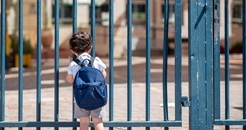 The foundations for inequality are reinforced at pre-school
The foundations for inequality are reinforced at pre-school
From an article by Bold
Sébastien Goudeau, Associate Professor at the University of Poitiers, studies the early roots of achievement gaps and how pre-schools can inadvertently disadvantage working-class students. Here are excerpts from an interview about the power that social situations can have on individuals:
Before becoming a researcher, I was a primary school teacher for six years. During that time, I often asked myself this question: Although teachers do their best to offer all children in the classroom the same chances, why do schools fail to level the social playing field? In France, and perhaps other countries, many teachers, parents, and psychologists believe that differences in academic achievement reflect individual characteristics such as intelligence, motivation, or self-control. Wanting to find out whether this is true, and if not, what is really behind classroom inequalities, I decided to pursue PhD in social psychology, focusing on how the learning environment impacts academic performance.
When I started my PhD studies, I was immediately fascinated by research on stereotype threat – the idea that fear of being judged according to a stereotype reduces performance – and the negative impact of a cultural mismatch between the home and school. Inspired by this research, I decided to investigate how classroom interactions and social comparisons between children can perpetuate inequalities. I observed that when children compare themselves with their peers, or feel pressure from a teacher to perform, their achievement may suffer.
In pre-schools, whole-class discussions are intended to give all children equal opportunities to speak, with the goal of reducing any disparities in language skills that may stem from social class. However, my team found that such discussions do not in fact offer every child the same opportunity for oral participation. Instead, working-class children speak less, and less frequently, than their middle- and upper-class peers, whether or not contributions are solicited by the teacher.
Importantly, these differences are not due to differences in oral language proficiency – it is not because they lack the ability to express themselves that working-class students talk less. Rather, the working-class environments in which these children are raised, clash with the middle-class norms that are prevalent in schools. The way they express themselves and their cultural experiences are less valued in the classroom.
To understand the power of context on inequalities, I also looked at how children and teachers explain differences in achievement. Young children, for example, appear to believe that differences in achievement are due to inherent individual characteristics. Pre-schoolers tend to believe that differences in oral participation reflect inherent characteristics such as ability or effort. These explanations can affect learning, which ultimately contributes to educational inequalities. Indeed, when middle- and upper-class students perceive that they are viewed positively, this may reinforce their (already strong) patterns of engagement, setting them up for academic success in the future. Conversely, working-class students may believe that they are seen as less competent, which might make them more reluctant to contribute in the future - a vicious cycle.
Inequalities that are constructed at preschool lay the groundwork for achievement gaps throughout a student’s educational career. In a recent intervention, we examined how teachers can level the playing field by providing equal opportunities for engagement for students from different backgrounds. We began the intervention by making teachers aware of variations in oral contributions by social class. We pointed out that these differences are malleable, and not a reflection of fixed differences in ability; they are more likely the product of a cultural mismatch between the experiences of working-class students and the school environment. Finally, we suggested some strategies for ensuring that all children have equal opportunities to participate. We are still analysing the data but we hope that strategies like monitoring children’s participation will help to address the inequalities that currently exist.
It is clear that subtle cues, such as non-verbal feedback, can influence how children think, feel, and behave. I have also come to have a more contextual and malleable view of individuals – understanding that people can change.
In recent years, valuable new tools have been developed for assessing behaviour and psychology, allowing researchers to explore interactions within a group and the psychological consequences of those interactions. I intend to use these tools to measure behaviour in real-life situations. I am excited to use these new tools to study marginalized communities around the world with my collaborators. Together, I hope we can offer all children more equitable access to education and better opportunities for development and learning.
Read the full article here.
Retweet about this article:
From an article by Bold, 18/09/2024